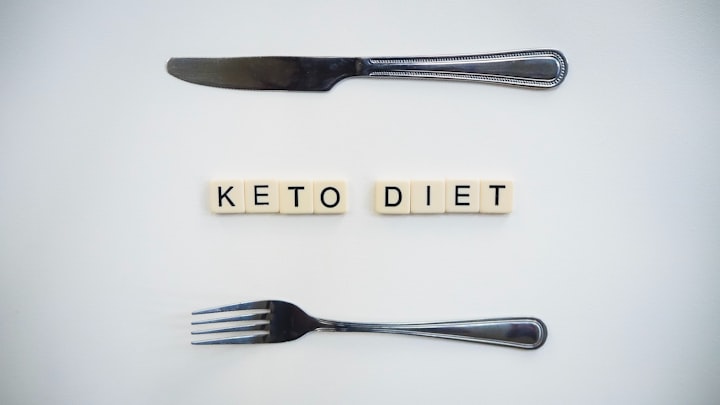"Unlocking the Therapeutic Benefits of the Ketogenic Diet: A Comprehensive Guide to Using the Keto Diet to Treat Dementia and Other Diseases"
"Exploring the Science and Health Benefits of the Ketogenic Diet for Dementia, Epilepsy, Type 2 Diabetes, Cancer, Cardiovascular Disease, and PCOS"

Introduction
The ketogenic diet, or keto diet, has been gaining popularity in recent years as a way to promote weight loss and improve overall health. However, research has also shown that this low-carbohydrate, high-fat diet may have therapeutic benefits for a variety of diseases, including dementia. In this article, we will explore the link between the keto diet and dementia, as well as other diseases that may be treated with this dietary approach.
What is the Ketogenic Diet?
The ketogenic diet is a high-fat, low-carbohydrate diet that forces the body to burn fat for fuel instead of glucose. When you consume carbohydrates, your body converts them into glucose, which is used as energy. However, when you restrict carbohydrates, your body begins to produce ketones, which can also be used for energy.
The ketogenic diet typically involves consuming 70-80% of calories from fat, 20-25% from protein, and 5-10% from carbohydrates. This macronutrient ratio can vary depending on the individual's goals and needs.
==> Just click here to download your FREE copy of 21 yummiest keto recipes
How Does the Ketogenic Diet Work?
The ketogenic diet works by putting the body into a metabolic state called ketosis. When you restrict carbohydrates, your body's glycogen stores are depleted, and your liver begins to produce ketones from fat. These ketones can be used as an alternative fuel source for the brain and body.
One of the main benefits of the ketogenic diet is its ability to reduce insulin and blood sugar levels. When you consume carbohydrates, your body releases insulin to help transport glucose into cells. However, when you restrict carbohydrates, insulin levels decrease, which can improve insulin sensitivity and reduce inflammation.
The Ketogenic Diet and Dementia
Dementia is a group of diseases characterized by a decline in cognitive function, including memory loss, language difficulties, and impaired judgment. Alzheimer's disease is the most common form of dementia, accounting for 60-80% of cases.
Research has shown that the ketogenic diet may have therapeutic benefits for dementia, particularly Alzheimer's disease. In animal studies, the ketogenic diet has been shown to improve cognitive function and reduce amyloid-beta plaque accumulation, a hallmark of Alzheimer's disease.
In a small pilot study, patients with mild cognitive impairment (MCI) were placed on a ketogenic diet for six weeks. The researchers found that the patients had improved memory function and reduced levels of amyloid-beta in the brain.
Other research has suggested that the ketogenic diet may improve mitochondrial function, reduce inflammation, and enhance brain cell metabolism, all of which may contribute to its therapeutic benefits for dementia.
>> Just click here to get your free copy of my new keto cookbook
The Ketogenic Diet and Other Diseases
In addition to dementia, the ketogenic diet may have therapeutic benefits for a variety of other diseases. Here are some examples:
Epilepsy: The ketogenic diet was originally developed as a treatment for epilepsy in the 1920s. Research has shown that the diet can reduce seizure frequency and improve cognitive function in patients with epilepsy.
Type 2 Diabetes: The ketogenic diet may be beneficial for patients with type 2 diabetes, as it can improve blood sugar control, reduce insulin resistance, and promote weight loss.
Cancer: Preliminary research has suggested that the ketogenic diet may have anti-tumor effects and improve the effectiveness of chemotherapy in cancer patients.
Cardiovascular Disease: The ketogenic diet may improve risk factors for cardiovascular disease, including high blood pressure, cholesterol, and triglyceride levels.
Polycystic Ovary Syndrome (PCOS): The ketogenic diet may improve insulin sensitivity and reduce symptoms of PCOS, including weight gain, irregular periods, and acne.
==> Just click here to get your free 21 keto recipes
Potential Risks and Side Effects of the Ketogenic Diet
While the ketogenic diet may have therapeutic benefits for certain diseases, it is not without potential risks and side effects. Here are some things to keep in mind if you are considering trying the ketogenic diet:
Nutrient Deficiencies: The ketogenic diet restricts many food groups, which may lead to nutrient deficiencies if you are not careful to include a variety of nutrient-dense foods.
Constipation: The low-fiber nature of the ketogenic diet may lead to constipation, especially if you are not consuming enough non-starchy vegetables.
Keto Flu: Some people may experience symptoms such as headaches, fatigue, and nausea when transitioning to the ketogenic diet. This is known as the "keto flu" and typically resolves within a few days to a week.
Increased Cholesterol Levels: The high-fat nature of the ketogenic diet may lead to an increase in LDL cholesterol levels in some individuals.
Kidney Stones: The ketogenic diet may increase the risk of kidney stones, especially in those with a history of kidney stones or kidney disease.
It is important to speak with your healthcare provider before starting the ketogenic diet, especially if you have a history of any medical conditions.
==> Click Here To Get Your FREE Copy Before It Expires
How to Follow a Ketogenic Diet
If you are interested in trying the ketogenic diet, here are some tips to help you get started:
Calculate your macronutrient ratios: Use an online calculator to determine your recommended macronutrient ratios based on your individual needs and goals.
Choose healthy fats: Focus on consuming healthy fats such as avocado, nuts, seeds, olive oil, and fatty fish.
Incorporate non-starchy vegetables: Non-starchy vegetables such as spinach, kale, broccoli, and cauliflower can provide important nutrients and fiber on a ketogenic diet.
Plan your meals: Plan out your meals and snacks ahead of time to ensure that you are meeting your nutrient needs and staying within your macronutrient ratios.
Stay hydrated: It is important to drink plenty of water on the ketogenic diet to avoid dehydration.
==> Just click here to download your personal free copy of this keto cookbook
Conclusion
The ketogenic diet may have therapeutic benefits for a variety of diseases, including dementia, epilepsy, type 2 diabetes, cancer, cardiovascular disease, and PCOS. However, it is important to speak with your healthcare provider before starting the ketogenic diet, as it may not be appropriate for everyone.
If you do decide to try the ketogenic diet, it is important to focus on consuming healthy fats, incorporating non-starchy vegetables, and staying hydrated. By following these tips, you can maximize the potential benefits of the ketogenic diet while minimizing any potential risks or side effects.
About the Creator
Luth Espindola
"Unlock a world of knowledge and explore new perspectives with every read. Join us now."






Comments
There are no comments for this story
Be the first to respond and start the conversation.